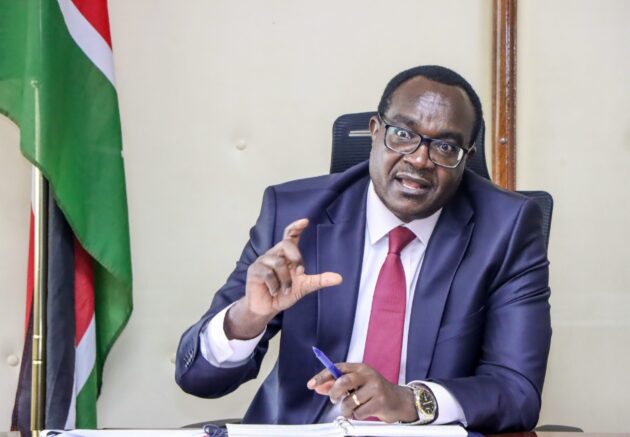
Funding Crisis Threatens Public Schools as MPs question sustainability of Free Education Policy » Capital News
NAIROBI, Kenya, Jun 5 – A funding crisis is threatening the operations of public schools across the country, with Education Cabinet Secretary Migos Ogamba coming under sharp scrutiny in Parliament over substantial delays and shortfalls in the disbursement of capitation funds.
Appearing before the National Assembly Committee on Education, CS Ogamba admitted that the Ministry of Education lacks a verified figure for the total pending bills owed to schools. Lawmakers, however, estimated the arrears could be as high as Sh64 billion, accumulated over several years.
“I didn’t come with that figure. The amount raised by Hon. Robert Mbui Sh64 billion could be accurate.The real question now is: what do we do with it, especially when we are still not receiving what was budgeted?”Ogamba posed.
Documents presented before the committee revealed that the approved annual capitation for secondary school students is Sh22,244 per learner.
However, for Term 1 of 2025, the Ministry only disbursed Sh8,818.61 per student representing just 50 percent of the intended allocation.
The Ministry disbursed Sh28.8 billion to support 3.2 million students, leaving a shortfall of Sh7.5 billion for the current financial year.
Primary schools were allocated Sh1,420 per learner annually, disbursed in a 50:30:20 ratio per term. This is significantly below the Sh2,238 per child recommended by the Presidential Working Party on Education Reform.
Junior secondary schools also suffered a funding gap, receiving only half of the Sh15,043 allocated annually per learner.
Additional data showed that for co-curricular activities in primary schools, only Sh36 of the Sh76 allocated per learner is actually sent to schools.
The remaining Sh40 is retained at the Ministry for national-level activities. This allocation, less than 50 percent of the total per child, drew criticism from lawmakers questioning oversight and quality assurance in school programs.
Members of Parliament expressed alarm at the deteriorating state of school financing, warning that the sustainability of the country’s free education policy is at serious risk due to delayed disbursements by the National Treasury.
Committee Chairperson Julius Melly questioned whether the country could continue offering free education amid ballooning student enrolment and stagnant funding.
“We bestowed on ourselves the commitment to offer free and fair education.But are we truly able to do so with growing numbers and limited resources?” Melly posed.
Deputy Minority Leader Robert Mbui, who raised the initial statement on delayed capitation, argued that the government must be candid about the situation and tell parents that the free education policy is unsustainable.
“It is time we acknowledge that free education is no longer sustainable under current constraints. It would be more honest to introduce cost-sharing with parents instead of perpetuating the illusion of free education,” Mbui stated.
Narok Woman Representative Rebecca Tonkei echoed concerns that school heads are being forced to operate with insufficient resources with no interventions being done by the government to address the issues.
“How free is education in Kenya when principals are told to manage with whatever they have, even when it is inadequate?” she asked.
Kibra MP Peter Orero sharply criticized the Ministry for penalizing school administrators who attempt to bridge the funding gap through additional levies.
“For the past ten years, schools have not received full capitation.Each learner is short by about Sh9,000 annually. Yet when headteachers raise the issue or seek alternatives, they are interdicted and victimized,”Orero said.
The Ministry attributed the delays in disbursement to late releases from the National Treasury and data inaccuracies in school submissions to the National Education Management Information System (NEMIS).
CS Ogamba urged lawmakers to support the ring-fencing of education funds, arguing that doing so would help insulate school financing from frequent disruptions and delays.
“We must prioritize education funding under the Constitution.Ring-fencing the education budget will help address the persistent shortfalls affecting students and schools,”he noted.
Ogamba conceded that operational difficulties caused by delayed funding were affecting both academic and co-curricular programs but reaffirmed the government’s commitment to free education,
“As to whether we have free education in this country the short answer is yes.But we are facing significant challenges that need urgent intervention,”he said,